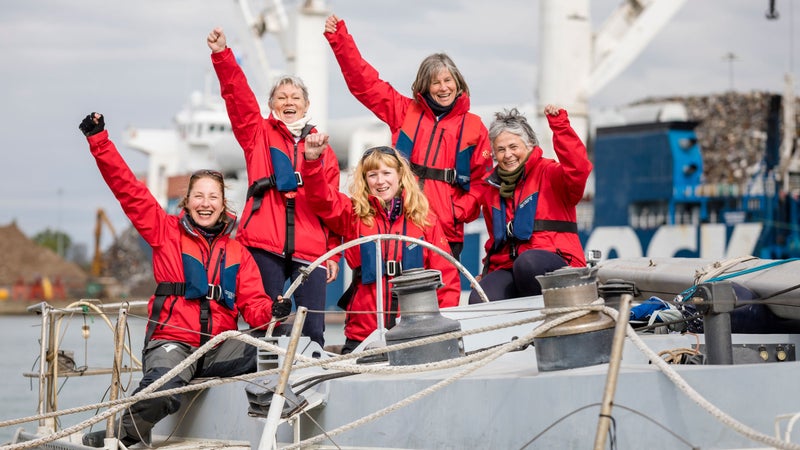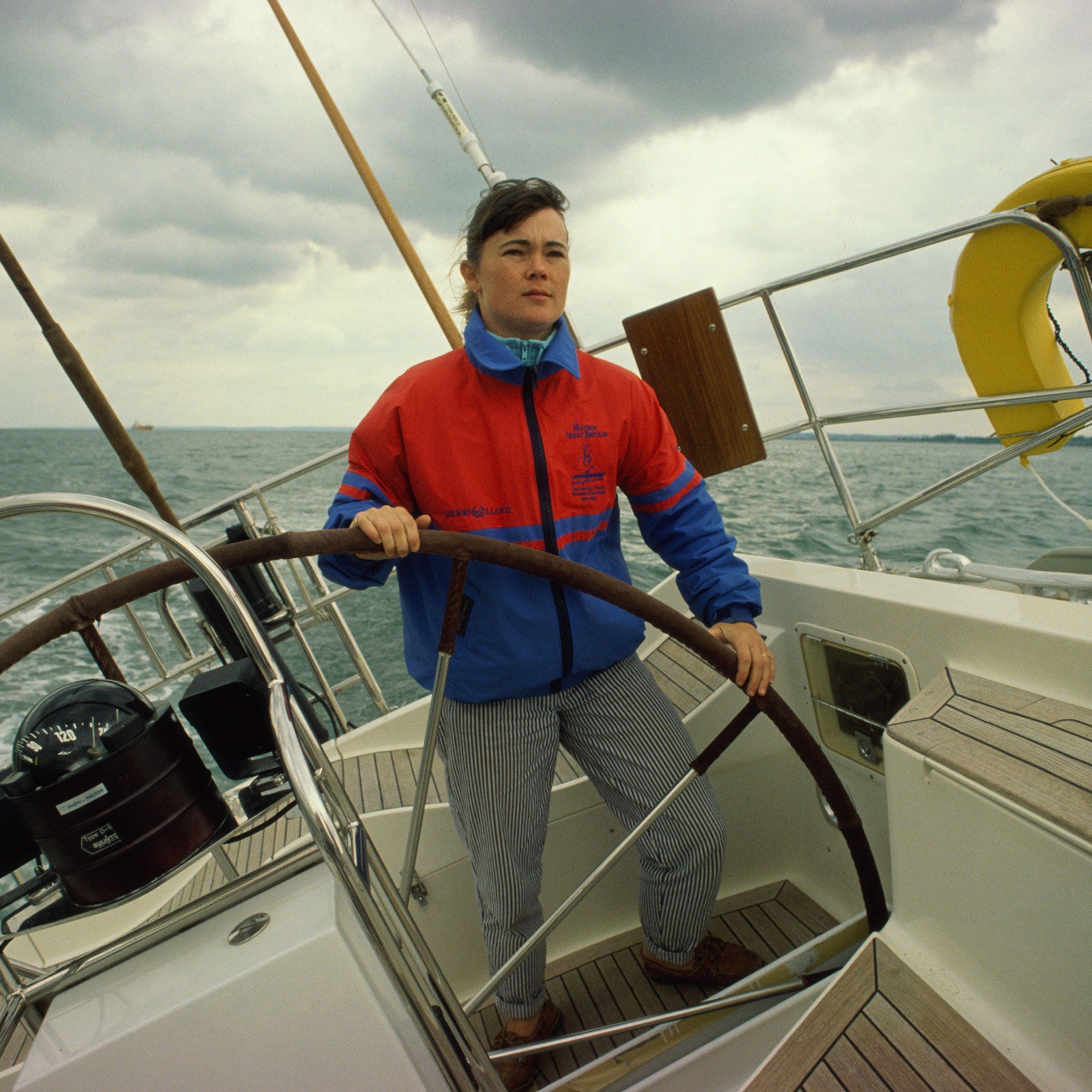Maiden, from director Alex Holmes about the first all-female sailing team to race around the world, opens with a somber voice-over from protagonist Tracy Edwards: “The ocean is always trying to kill you.” In fact, the mighty seas were just one obstacle the young skipper—then just 27 years old—and her crewmates faced while completing the 1989–90 Whitbread Round the World Race (which later became the Volvo Ocean Race). During the nine-month, 33,000-mile voyage, spanning England, Chile, and Australia, the crew also had to overcome skepticism and sexism with courage and perserverance.
The film, which hits select theaters today, intertwines archival footage from the race and one-on-one interviews with crew members recounting their experiences surviving everything from monstrous waves in the Southern Ocean to the day-to-day challenges of sharing such tight quarters. It also illuminates gender inequality in the male-dominated world of competitive sailing, which Edwards broke into by talking her way onto the crew of a boat competing in the 1985–86 Whitbread. That year she was one of just four women sailors in a field of 23 boats and 230 crew members. “I had to fight to get onto a boat, but when I did, it was just the best thing,” Edwards, now 56, told me.
The experience inspired Edwards to put together an all-women team for the 1989–90 Whitbread. But as the documentary chronicles, she soon met another challenge: nobody wanted to sponsor her. That is until she reached out to the late King Hussein I of Jordan, who she’d met years prior during a yacht charter. He organized funding for the purchase of the 58-foot secondhand yacht that would eventually become known as Maiden. Edwards and her teammates refurbished her for months before the race kicked off. Holmes, a veteran documentary filmmaker, turns the ensuing voyage into a rollicking ride on the big screen. The team won two legs in its division, and while we won’t spoil its overall finish, it was the best result for a British boat since 1977 and still remains the best finish for an all-female crew.
The aftermath of the race wasn’t always easy, not least following the team’s historic feat. But a couple of decades after Edwards retired from sailing, Maiden is back in her life. In 2014, around the same time Holmes was raising money for the Maiden film, Edwards got word that her beloved boat, which was sold after the Whitbread, had been abandoned in the Seychelles. So she raised money to refurbish her again, this time from Princess Haya Bint Al Hussein, King Hussein’s daughter. “She was in an absolutely terrible state when we got her back, so there was a lot of work to do,” Edwards says. The boat is currently sailing around the world once again, this time promoting , a nonprofit Edwards founded to advocate for gender equality and educational opportunities for girls.
Ahead of the Maiden film’s theatrical release, we spoke with Edwards about how she learned to sail, the impact of the Maiden crew’s accomplishment, and why she’s OK with not helming a yacht anymore.
On how she got into sailing: “I got my first boat when I was 17, growing up in England, and learned as I went, with no real direction or plan of any kind. I just fell into each job and the next boat and the next boat. My first Whitbread experience completely changed my whole view on sailing, which up until then had been a job. It then became a way of life, my whole reason for existing.”
On what it was like being the only woman on an all-male crew: “Very smelly! That was my initiation to the joys of not having to wash and not caring what people think. I looked awful most of the time. There’s nothing glamorous about this type of sailing around the world.”
On the crew’s attitude toward her: “I don’t think they were being sexist, but they just didn’t want a girl on the boat. It was just, ‘No one else has got a girl. Why do we have to have a girl?’ But then we won the leg coming into New Zealand, and I went from being a nuisance to their lucky charm. They were suddenly all very protective, and then it was, ‘We’re the only professional crew with a girl on the boat.’ So it changed into something good.”
On meeting King Hussein: “I was doing day work in Newport, Rhode Island, and someone asked if I wanted to do a crewing job for the day. The guests turned out to be King Hussein and Queen Noor. Their son, who’s now King Abdullah, was graduating from Georgetown University, and they took the boat out for the day. I guess because I was 21 and didn’t really know who he was, I just treated them like I would treat anyone. I think he liked that. We spoke for a long time, and he was fascinated with my lifestyle. Over the years, we formed a very special friendship. He was an extraordinary human being who changed the course of my life.”
On the process of refurbishing Maiden for the race: “We had to literally take her apart and redesign her to make her more effective for women to sail, strength-wise. We opened up the interior, removed all the heavy wood, and replaced it with carbon fiber, honeycomb boards, and resin. We begged and borrowed tools and parts. When we launched, she was perfect.”
On the criticism the all-women team faced from the media and male competitors: “What is shocking to me now is that we just accepted that was the way things were and pretty much ignored it. Some were openly laughing at us, and that really hurt. It just proved how much we had to do and how important it was to succeed, because if we didn’t, it would be harder for women the next time.”

On the skills she needed to skipper a team around the world: “I’m not the best sailor in the world. But I pick great teams. I pick people who are better than me. I’m a good leader and a good navigator. I’m just fascinated with navigation and finding my way and using, in some cases, equipment that was used hundreds of years ago. I love that element of it.”
On where the original footage of the 1989–90 Whitbread came from: “One of the rules of the Whitbread was that everyone has to take a camera. We felt it was really important to document what we were doing. So we sent Jo, the cook, on a camera course, and she ended up doing a lot of the filming. Also, we were the only boat that had a camera affixed to our radar mast.”
On the challenges of being aboard a boat for weeks at a stretch: “The constant deprivation of normal living conditions. Having to steady your body all the time and be aware of every single movement you make. Women have great stamina, so we just got used to it. I think also taking care of each other was something I had never seen on a big racing boat with men.”
On the toughest leg of the race, through the Southern Ocean: “It’s cold, it’s wet, it’s miserable, it can be horrifying. But then the sailing is absolutely amazing, and that’s the payoff. By the time we left to go into the Southern Ocean, we’d done so many miles together. We’d done a lot of training. We really felt very strong as a team.”
On Maiden’s reception at the end of the race: “All the ships were around us blowing their horns—it was just amazing. People were throwing flowers onto the boat. Fans had heard that we were starving at that point, because we’d run out of food the week before. A boat came out with hamburgers in a basket. But we couldn’t accept them because that’s taking outside assistance, so we could smell this gorgeous food and we couldn’t accept it.”
On the impact of her Whitbread accomplishment: “I don’t think we knew how important it was when we finished—we just went on and did the next thing. But when I had my daughter, Mackenna, in 2000, everything suddenly became so much more relevant. I wasn’t just fighting the fight for me and other women, it was for her next generation. I don’t want her to have to go through what we went through. You can say, ‘Oh, things have changed,’ but not enough.”
On how much sailing she does today: “None. After surviving the whole Whitbread without one single injury, in 1992, I was kicked in the base of my spine by a horse and broke some vertebrae and did some serious damage. I ignored it over the years as I was sailing, and I’m paying for it now. My back injury is so bad now, sailing would just be stupid. But I love running the Maiden Factor Foundation, and I’m happy to provide the vehicle for everyone else to sail her now. And I’m also happy to be warm and dry.”


